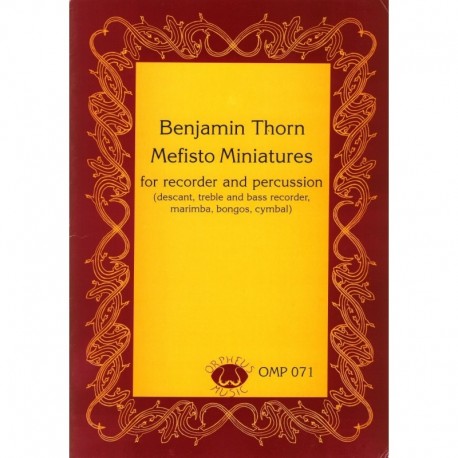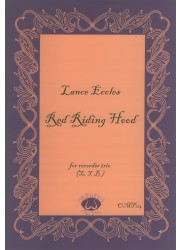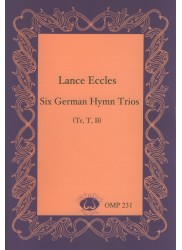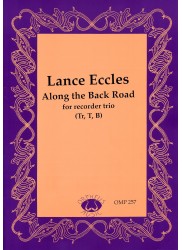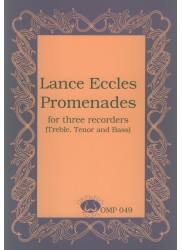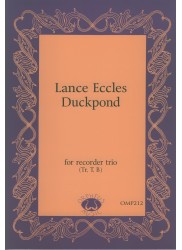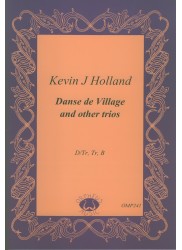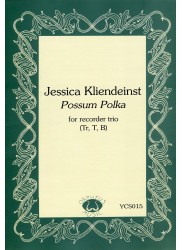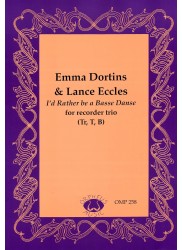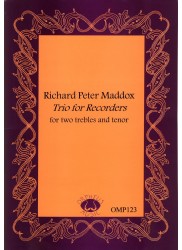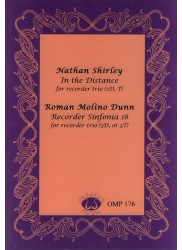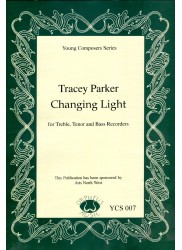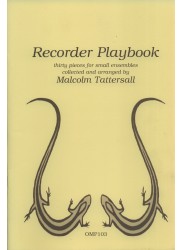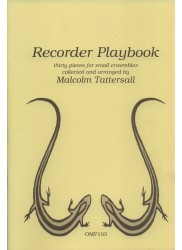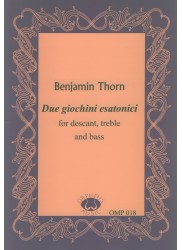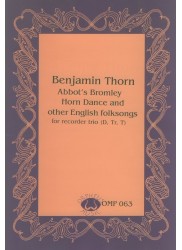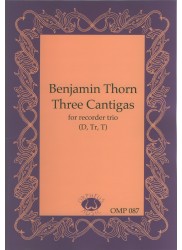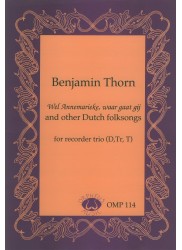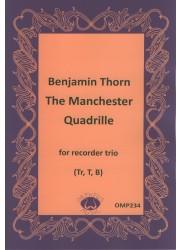No products
Prices are tax included
Mefisto Miniatures
Composer: Thorn - Benjamin
Instrumentation: Descant - Treble - Bass + Percussion
Period/genre: Australian Contemporary
Grade: Difficult
More info
*Contemporary Pieces.* Ten short tuneful pieces for various recorders (D, Tr, B) and percussion (marimba, bongos, cymbal). A short version for solo treble may be performed.
1. Cantabile
2.
3.
4.
5.
5a. Solo Treble version
6.
7.
8. Freely
9.
10.
_Score 11 pp._
OMP071 Benjamin Thorn Mefisto Miniatures
Taking their name from the well-known waltzes by Liszt, the "Mefisto Miniatures" are ten short pieces scored for a range of recorders (soprano, alto and bass) and percussion (marimba, bongos and cymbal). Although the score contains some interesting biographical details of Benjamin Thorn, rather disappointingly there is no text relating to the performance of this work. However, it seems fairly clear that the composition can be performed in a variety of forms: firstly, as originally intended as a mixture of pieces for solo recorder, solo percussion and duets featuring recorder and percussion; and secondly, as a selection of up to eight solos for recorder.
No. 1 is an elegant solo for bass recorder in 5/8, with a relentlessly lilting rhythm. Almost all written in the lower octave, there is a richly expressive tone throughout. No. 2 begins with an 8-bar marimba introduction before the soprano recorder enters. This miniature in 6/8 has the feel of a slow jog with a feel of G minor, although the several F naturals and A flats suggest modality. This movement, as with No. 5 also has an alternative version for solo alto.
No. 8 is a fantasia-like solo for alto recorder marked "freely". The melody meanders with rhythmic flexibility through this miniature without time signature. Although bar lines are present, very rarely do two consecutive bars have the same number of beats. The final piece, for alto and marimba, is a challenging piece with rapidly changing time signatures - from 4/4 and 7/8 to 5/8. Whilst this creates an unsettled feeling to the piece, the movement is sufficiently strong to provide a suitable finale to this ambitiously scored, yet not excessively difficult, work.
Adam J Dopadlik, The Recorder Magazine, Spring 2002
OMP071 Benjamin Thorn, Mefisto Miniatures
OMP083 Benjamin Thorn, Two Diagonals and a Squiggle
OMP066 Richard Peter Maddox, Post Proelium Deliberemus
Combining recorder with percussion usually results in music that is, at the very least, interesting. The recorder, primarily a producer of pitches, and percussion instruments, which are for the most part timbre-oriented, naturally complement one another. Viewing a battery of percussion instruments on stage and observing the physical act involved in playing them will also add interest to a performance.
The ten movements of Benjamin Thorn's Mefisto Miniatures are indeed very brief, but are they Mefisto? I can't find that word in any dictionary. Perhaps it is Thorn's personal way of spelling "Mephisto", a short form of "Mephistopheles". However, this fairly gentle music does not strike me as being particularly devilish. Thorn's melodies are modal, and the music includes duets combining recorder with the pitched marimba in some movements and with non-pitched bongos and suspended cymbals in others. There are also two solo movements for each performer. The music is not very difficult and could potentially be handled by an upper intermediate recorder player.
Two Diagonals and a Squiggle is an entirely different story. This is vintage Thorn, which is to say it is powerful, dynamic, colourful, quirky, humorous, high-spirited and exciting. Like the famous Voice of the Crocodile, this piece is based on cellular ideas that are subjected to various mutations and transformations. Thorn uses some special effects in this composition; but even though the ones he employs most - multiphonics and flutter tonguing - are also the most clichéd, he manages to thoroughly integrate them into his unique aesthetic vision, thereby making them vital. The instruments played by the percussionist in all three of the movements include four tom-toms, four tin cans, and five temple blocks. This is a superb work suited to professionals.
Most unique among these items is Richard Peter Maddox's, Post Proelium Deliberemus (deliberations after the battle). Maddox mixes modern day aleatoric procedures and minimalism with aspects of Baroque form and style, using a conservative tonal language. Though he employs a wide range of recorders, most of the activity occurs in the upper parts, with the sopranino taking a concertant role.
The first movement beings with a bit of bombast. After a chaotic aleatoric opening, a dense, repetitive minimal music section leads to a brief, out-of-key fanfare. The main body of the movement consists of a fugue that is twice interrupted by what might best be described as an imitation Vivaldi sopranino concerto.
The second movement is a slow aria for the sopranino set over the incessant repetition of a C Major chord, by the recorder ensemble. The sopranino is again in a concertant role in the fast final movement, playing a melody that may have some Vivaldi-like contours but, in a general way, resembles "The Sailor's Hornpipe." As in the second movement, the recorder ensemble serves as a subordinate backdrop. Unlike in the other movements, where the percussionist plays simple ostinato patterns on two tom-toms, the drums here are exclusively featured in a brief, loud solo gesture that perhaps might be a reference to gunfire in a battle. This gesture appears as an interjection at cadence points. It is shocking on first hearing, but after a while becomes progressively predictable, then ridiculously funny. It appears a dozen times!
The editions are nicely printed. There are bad page turns in Two Diagonals and a Squiggle: two in the recorder part and one in the percussion. Two Diagonals... is a gem and the other pieces are also worth checking out.
Pete Rose, American Recorder, March 2003
30 other products in the same category:
Reference: OMP214
Brand: Orpheus Music
Red Riding Hood
Composer: Eccles - LanceInstrumentation: Treble - Tenor - BassPeriod/genre:...
In StockReference: OMP214.pdf
Brand: Orpheus Music
Red Riding Hood
PLEASE NOTE - DOWNLOADABLE PDF VERSION Composer: Eccles -...
$29.50 -20%In StockReference: OMP231
Brand: Orpheus Music
Six German Hymn Trios
Composer: Eccles - LanceInstrumentation: Treble - Tenor - BassPeriod/genre:...
In StockReference: OMP231.pdf
Brand: Orpheus Music
Six German Hymn Trios
PLEASE NOTE - DOWNLOADABLE PDF VERSION Composer: Eccles -...
$26.50 -20%In StockReference: OMP257
Brand: Orpheus Music
Along the Back Road
Composer: Eccles - LanceInstrumentation: Treble - Tenor - BassPeriod/genre:...
In StockReference: OMP257.pdf
Brand: Orpheus Music
Along the Back Road
PLEASE NOTE - DOWNLOADABLE PDF VERSION Composer: Eccles - Lance...
$19.00 -20%In StockReference: OMP049.pdf
Brand: Orpheus Music
Promenades
PLEASE NOTE - DOWNLOADABLE PDF VERSION Composer: Eccles - Lance...
$19.00 -20%In StockReference: OMP212
Brand: Orpheus Music
Duckpond
Composer: Eccles - LanceInstrumentation: Treble - Tenor - BassPeriod/genre:...
In StockReference: OMP241
Brand: Orpheus Music
Danse de Village and other trios
Composer: Holland - Kevin JInstrumentation: Descant/Treble - Treble -...
In StockReference: OMP241.pdf
Brand: Orpheus Music
Danse de Village and other trios
PLEASE NOTE - DOWNLOADABLE PDF VERSION Composer: Holland - Kevin...
$26.50 -20%In StockReference: YCS015
Brand: Orpheus Music
Possum Polka
Composer: Kliendeinst - JessicaInstrumentation: Treble - Tenor -...
In StockReference: YCS015.pdf
Brand: Orpheus Music
Possum Polka
PLEASE NOTE - DOWNLOADABLE PDF VERSION Composer: Kliendeinst -...
$20.50 -20%In StockReference: OMP258
Brand: Orpheus Music
I'd Rather be a Basse Danse
Composer: Eccles/DortinsInstrumentation: Treble - Tenor - BassPeriod/genre:...
In StockReference: OMP258.pdf
Brand: Orpheus Music
I'd Rather be a Basse Danse
PLEASE NOTE - DOWNLOADABLE PDF VERSION Composer: Eccles/Dortins...
$16.00 -20%In StockReference: OMP123
Brand: Orpheus Music
Trio for Recorders
Composer: Maddox - Richard PeterInstrumentation: 2 Trebles -...
In StockReference: OMP123.pdf
Brand: Orpheus Music
Trio for Recorders
PLEASE NOTE - DOWNLOADABLE PDF VERSION Composer: Maddox - Richard...
$25.00 -20%In StockReference: OMP176
Brand: Orpheus Music
In the Distance and Recorder Sinfonia 18
Composer: Shirley/DunnInstrumentation: 2 Descants - Tenor (or 3 Descants; or...
In StockReference: YCS007
Brand: Orpheus Music
Changing Light
Composer: Parker - Tracey Instrumentation: Treble - Tenor - Bass...
In StockReference: OMP103
Brand: Orpheus Music
Recorder PlayBook
Composer: Tattersall - MalcolmInstrumentation: Various Small Recorder...
In StockReference: OMP103.pdf
Brand: Orpheus Music
Recorder Play Book
PLEASE NOTE - DOWNLOADABLE PDF VERSION Composer: Tattersall -...
$25.00 -20%In StockReference: OMP018
Brand: Orpheus Music
Due giochini esatonici
Composer: Thorn - BenjaminInstrumentation: Descant - Treble -...
In StockReference: OMP018.pdf
Brand: Orpheus Music
Due giochini esatonici
PLEASE NOTE - DOWNLOADABLE PDF VERSION Composer: Thorn -...
$17.50 -20%In StockReference: OMP063
Brand: Orpheus Music
Abbot's Bromley Horn Dance
Composer: Thorn - BenjaminInstrumentation: Descant - Treble -...
In StockReference: OMP087
Brand: Orpheus Music
Three Cantigas
Composer: Thorn - BenjaminInstrumentation: Descant - Treble -...
In StockReference: OMP087.pdf
Brand: Orpheus Music
Three Cantigas
PLEASE NOTE - DOWNLOADABLE PDF VERSION Composer: Thorn -...
$19.00 -20%In StockReference: OMP114
Brand: Orpheus Music
Wel Annemarieke, waar gaat gij and other Dutch folksongs
Composer: Thorn - Benjamin Instrumentation: Descant - Treble - Tenor...
In StockReference: OMP114.pdf
Brand: Orpheus Music
Wel Annemarieke, waar gaat gij and other Dutch folksongs
*PLEASE NOTE > DOWNLOADABLE-ONLY PDF VERSION Composer: Thorn - Benjamin...
$20.50 -20%In StockReference: OMP063.pdf
Brand: Orpheus Music
Abbot's Bromley Horn Dance
PLEASE NOTE - DOWNLOADABLE PDF VERSION Composer: Thorn -...
$20.50 -20%In StockReference: OMP234
Brand: Orpheus Music
The Manchester Quadrille
Composer: Thorn - BenjaminInstrumentation: Treble - Tenor - BassPeriod/genre:...
In StockReference: OMP234.pdf
Brand: Orpheus Music
The Manchester Quadrille
PLEASE NOTE - DOWNLOADABLE PDF VERSION Composer: Thorn -...
$19.00 -20%In Stock

